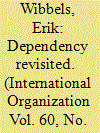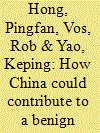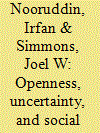|
|
|
Sort Order |
|
|
|
Items / Page
|
|
|
|
|
|
|
| Srl | Item |
| 1 |
ID:
072261


|
|
|
|
|
| Publication |
2006.
|
| Summary/Abstract |
While increased exposure to the global economy is associated with increased welfare effort in the Organization for Economic Cooperation and Development (OECD), the opposite holds in the developing world. These differences are typically explained with reference to domestic politics. Tradables, unions, and the like in the developing world are assumed to have less power or interests divergent to those in the OECD-interests that militate against social spending. I claim that such arguments can be complemented with a recognition that developed and developing nations have distinct patterns of integration into global markets. While income shocks associated with international markets are quite modest in the OECD, they are profound in developing nations. In the OECD, governments can respond to those shocks by borrowing on capital markets and spending countercyclically on social programs. No such opportunity exists for most governments in the developing world, most of which have limited access to capital markets in tough times, more significant incentives to balance budgets, and as a result cut social spending at the times it is most needed. Thus, while internationally inspired volatility and income shocks seem not to threaten the underpinnings of the welfare state in rich nations, it undercuts the capacity of governments in the developing world to smooth consumption (and particularly consumption by the poor) across the business cycle.
|
|
|
|
|
|
|
|
|
|
|
|
|
|
|
|
| 2 |
ID:
128042


|
|
|
|
|
| Publication |
2014.
|
| Summary/Abstract |
This study offers an investigation of the relationship between defense and social spending in the People's Republic of China. In particular, three consecutive questions are answered here. Does a warfare-welfare tradeoff exist in China's budgetary allocation? Is it positive or negative? What is the causal direction involved? By applying a vector autoregression analysis for the period of 1952-2006, this study finds a unidirectional crowd-out effect going from defense to social spending.
|
|
|
|
|
|
|
|
|
|
|
|
|
|
|
|
| 3 |
ID:
084742


|
|
|
|
|
| Publication |
2008.
|
| Summary/Abstract |
Our study shows that China could contribute to an orderly global rebalancing using a package of policies to stimulate its domestic consumption. These policies include a progressive appreciation of the RMB, fiscal stimulation by increasing expenditure on education, health care, social safety nets and poverty reduction, income policies to reduce inequality and to strengthen wage income, and reforms of the financial system to improve financial efficiency and to mitigate financial constraints. By implementing such policies, China's external surplus could be narrowed and its domestic imbalances improved. The excessively high savings rate could be lowered and the share of household consumption increased, even though GDP growth would moderate slightly.
|
|
|
|
|
|
|
|
|
|
|
|
|
|
|
|
| 4 |
ID:
094978


|
|
|
|
|
| Publication |
2010.
|
| Summary/Abstract |
It is well-established that prolonged left-wing incumbency has a positive long-term effect on welfare effort in terms of high levels of social spending and reduced levels of economic inequality and poverty. Prolonged left-wing incumbency also influences the institutional set-up of welfare states, in particular generating strong support for existing arrangements in countries with large welfare states. The issue ownership literature furthermore shows that the public comes to distrust right-wing parties as defenders of the welfare state. In countries that have a tradition of left-wing incumbency it is particularly important for right-wing governments to compensate for the distrust of the public because of the popularity of the welfare state and strong vested interests. While right-wing governments on average are negatively associated with social spending, there is a strong positive association between right-wing government and social spending in traditionally left-wing countries. It is even the case that right-wing governments in these countries spend more on social welfare than left-wing governments. This indicates that right-wing governments are forced to compensate for the lack of public trust by being even more generous than the left.
|
|
|
|
|
|
|
|
|
|
|
|
|
|
|
|
| 5 |
ID:
168857


|
|
|
|
|
| Summary/Abstract |
This work examines how U.S. economic sanctions affect social welfare spending in authoritarian countries. U.S. economic sanctions play a role of leading autocratic targets to change social policy through two theoretical channels. First, U.S. economic sanctions may reduce autocrats’ resources to buy off supports from ruling elite groups and so force autocrats to reallocate government expenditure in favor of their supporting groups. Consequently, autocrats facing longer U.S. sanctions are likely to cut spending on public goods and services, especially on education and health care spending. Second, the impacts of U.S. sanction duration on social spending vary according to political variables such as autocrats’ pseudo-democratic institutions. The empirical findings show that, even when U.S. sanctions last a long time, autocrats under nominal democratic institutions cut spending on education and health to a lesser degree than do autocrats with no such institutions. In contrast, autocrats relying on pseudo-democratic institutions reduce social security spending a little more than did non-institutionalized autocrats.
|
|
|
|
|
|
|
|
|
|
|
|
|
|
|
|
| 6 |
ID:
091034


|
|
|
|
|
| Publication |
2009.
|
| Summary/Abstract |
We extend the literature on openness and spending in developing countries arguing that the effect of increasing openness depends on both regime type and the level of openness. Democracies respond to increases in openness by increasing spending while dictatorships respond by decreasing spending. However, the degree to which countries pursue the strategy of choice depends on the level of openness. In autarkic countries, an increase in import competition has more severe consequences for perceptions of job insecurity and dislocation. In response, government management of openness will be more vigorous under these conditions regardless of whether the leader increases or decreases spending. Economic selection mechanisms at work will produce an outcome wherein, at higher levels of openness, further import liberalization has smaller effects on perceptions of job insecurity and dislocation. Hence, both the demand and the supply of government management of openness will be lower.
|
|
|
|
|
|
|
|
|
|
|
|
|
|
|
|
| 7 |
ID:
186562


|
|
|
|
|
| Summary/Abstract |
In the last three decades, many Asian democracies have decentralized their political systems to promote the democratic, equal, and efficient distribution of national resources across regions. Nonetheless, most of these countries, including South Korea, are still in a stage of “partial fiscal decentralization,” in which locally elected officials have spending authority, while a significant portion of their financing relies on transfers from the central government. This article argues that the decentralized distribution is significantly influenced by the partisan interests of central and local governments. The central government transfers more funds to local governments that their co-partisans govern, and local incumbents follow partisan policy priorities to obtain the allocation of available fiscal resources. This argument is strongly supported by the empirical analysis of subsidy transfers and regional social expenditures in South Korea from 2002 to 2015. First, we find that the central government in Korea transfers larger subsidies to politically aligned regions. Second, regional governments with larger subsidy transfers have higher levels of social expenditures. Third, governors or mayors affiliated with a progressive party spend significantly more on social welfare and education than do those affiliated with a conservative party.
|
|
|
|
|
|
|
|
|
|
|
|
|
|
|
|
| 8 |
ID:
143146


|
|
|
|
|
| Summary/Abstract |
Remittances are a significant source of foreign exchange for developing economies. I argue that remittances, due to their compensation and insurance functions, will increase the general income level and economic security of recipients, thereby reducing their perceived income risk. Over time, this will dampen demand from recipients for government taxation and social insurance. Therefore, I expect increases in income remitted to an economy to result in reduced levels of social welfare transfers at the macro-level. This dynamic can help us to understand spending patterns in developing democracies, and the absence of demand for social security transfers in countries with high levels of inequality and economic insecurity. I test this argument with a sample of 18 Latin American states, over the period 1990 to 2009, and subject the central causal mechanism to a battery of statistical tests. The results of these tests provide strong support for this argument.
|
|
|
|
|
|
|
|
|
|
|
|
|
|
|
|
|
|
|
|
|